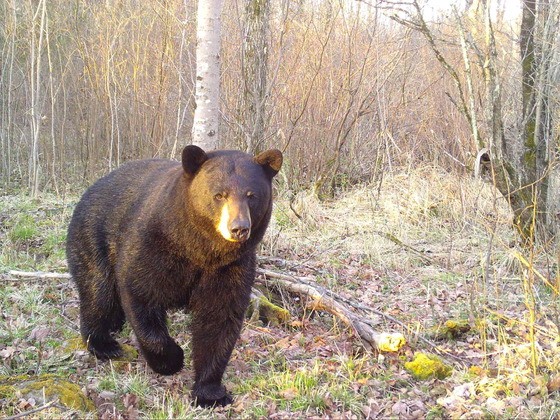FOR IMMEDIATE RELEASE: April 24, 2025
Be Bear Aware: Take Steps Now To Avoid Potential Conflicts with Black Bears This Spring
To avoid potential conflicts, it’s important to recognize what attracts black bears and take steps to reduce these attractants whenever possible.
MADISON, Wis. – As the weather warms and people across the state begin spending more time outside, the Wisconsin Department of Natural Resources (DNR) encourages the public to be bear aware and take steps to prevent potential conflicts with black bears this spring.
Every spring, Wisconsin’s estimated 24,000 black bears emerge from their winter torpor and leave their dens in search of food and potentially new territory. These explorations sometimes cause unexpected interactions between black bears and the public. Bears are normally solitary forest animals, but their powerful sense of smell can lead them into urban areas in search of food, especially in the spring and fall.
To avoid potential conflicts, it’s important to recognize what attracts black bears and take steps to reduce these attractants whenever possible. Black bears are known for returning to locations where they’ve found good food sources, so prevention is the best tactic.
Although black bears are much more common in the northern half of the state, southern Wisconsin has seen more black bear activity in recent years. No matter where in Wisconsin you live or play, follow these basic steps from our friends at BearWise to avoid attracting black bears around your home or campsite:
- Never Feed or Approach Bears – Never feed a bear, whether intentionally or not. The risk of unexpected interactions increases when bears begin to associate people with food. If bears find a consistent food source around people or people actively feed a bear, the bear will make a habit of visiting the area or approaching people.
- Secure Food, Garbage and Recycling – Food and food odors attract bears, so don’t reward them with easily available food, liquids or garbage.
- Remove Bird Feeders When Bears Are Active – Birdseed and grains have lots of calories, so they’re very attractive to bears. Removing feeders is the best way to avoid creating conflicts with bears.
- Never Leave Pet Food Outdoors – Feed pets indoors when possible. If you must feed pets outside, feed in single portions and remove food and bowls after feeding. Store pet food where bears can’t see or smell it.
- Clean and Store Grills – Barbeque grills and picnic tables often have leftover food scraps or residues on them that can attract black bears. Clean surfaces after use in public spaces to reduce negative human-bear interactions. Store clean grills and smokers in a secure area that keeps bears out.
- Alert Neighbors to Bear Activity – See bears in the area or evidence of bear activity? Tell your neighbors and share information on how to avoid bear conflicts. Bears have adapted to living near people; now it’s up to us to adapt to living near bears.
Know What To Do If You Encounter A Bear
If a black bear is near your home or cabin, from a safe location, try to scare the bear away by making loud noises (like clanging pots and pans together) or throwing objects in the bear’s direction. Black bears tend to avoid interactions with people if escape is possible, so make sure it has a clear escape route – never corner a bear. Do not turn your back to a bear or run away. Once the bear is gone, remove any items that may have attracted the bear in the first place.
If you encounter a black bear while in the woods, stay calm and do not run. Wave your arms and make loud noises to scare it away. Back away slowly and seek a safe location from where you can wait for the bear to leave. Never approach a bear. For your safety, do not attempt to break up a fight between a pet and a bear.
Learn more about being BearWise in the outdoors and what to do if you encounter a black bear.
If unable to resolve a recurring issue with a nuisance bear, contact the U.S. Department of Agriculture (USDA)’s Wildlife Services toll-free lines:
- USDA Wildlife Services, Northern Wisconsin: 800-228-1368 (in-state) or 715-369-5221
- USDA Wildlife Services, Southern Wisconsin: 800-433-0663 (in-state) or 920-324-4514
For more information about avoiding unexpected interactions with black bears, visit the DNR’s Black Bear Management webpage or download the printable Living with Black Bears pamphlet. |
